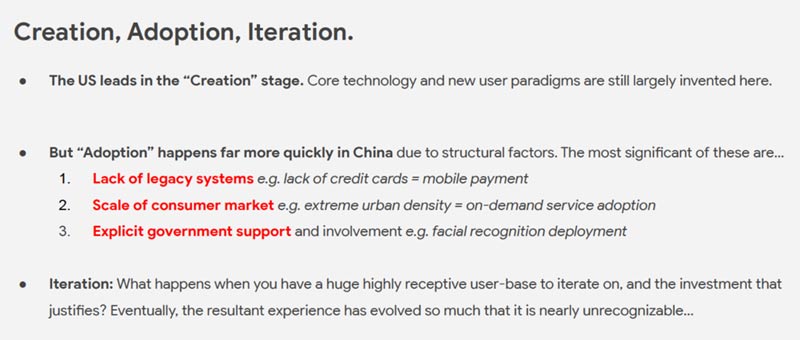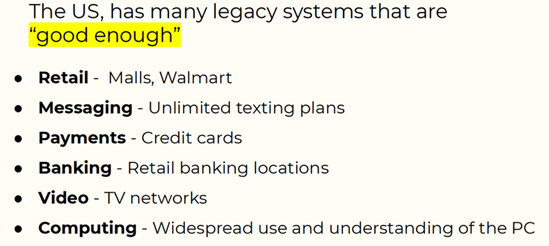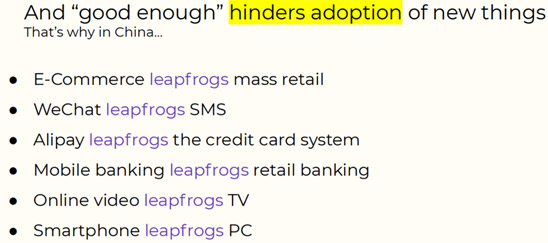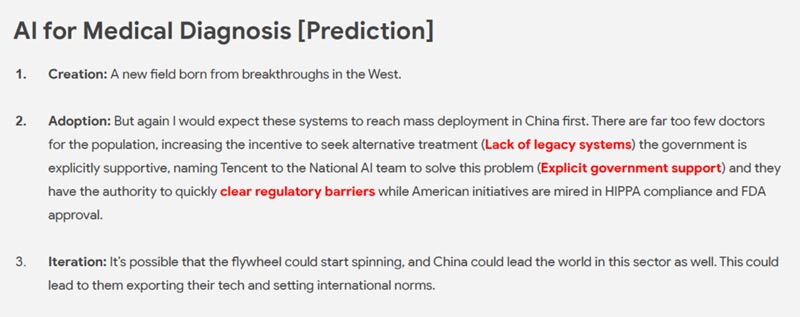USA- Projet de loi pour autoriser les prescriptions médicales par IA
IA = Intelligence artificielle
Destruction de la médecine ?
Un projet de loi pour autoriser les prescriptions par l'IA
Analyse par Tessa Lena 30 octobre 2021
Le 30 septembre 2021, David Schweikert (R-Arizona) a présenté un projet de loi (HR5457) qui, s'il était adopté, qualifierait l'IA en tant que médecin, habilité à prescrire des médicaments.
Ouah là. Cela place la conversation sur la souveraineté professionnelle des médecins (professional sovereignty of physicians) dans un tout autre contexte – et malheureusement, ce contexte réformiste a toujours existé. Examinons d'abord le texte du projet de loi. Il dit ce qui suit :
« Modifier la loi fédérale sur les aliments, les médicaments et les cosmétiques afin de préciser que les technologies d'intelligence artificielle et d'apprentissage automatique peuvent être qualifiées de praticiens éligibles pour prescrire des médicaments si elles sont autorisées par l'État concerné et approuvées, autorisées par la Food and Drug Administration, et à d'autres fins.
" La partie où il est dit "à d'autres fins" est intéressante. Et si l'IA déterminait que quelque chose est sûr et efficace - et qu'il devrait être mandaté ? Difficile de débattre avec l'IA. La chose sûre et efficace pourrait être une thérapie, un système nutritionnel pour lutter contre le changement climatique, un régime d'hygiène mentale - n'importe quoi, vraiment. La prescription de médicaments n'est qu'un pied dans la porte, mais le ciel est la limite. Et qui poursuivons-nous ?
Et qui est David Schweikert? Actuellement, il remplit son sixième mandat au Congrès des États-Unis. À l'heure actuelle, il « siège au comité des voies et moyens, ayant précédemment siégé au comité des services financiers.
Il siège également au comité économique mixte bicaméral, en tant que membre principal de la Chambre républicaine, copréside le groupe de travail sur la fièvre de la vallée avec le chef de la minorité parlementaire Kevin McCarthy, est le coprésident républicain du Blockchain Caucus, coprésident de la Tunisie Caucus et coprésident du Caucus de télésanté. »
Selon son site Internet, il « a défendu des réformes clés telles que la loi sur la réforme de la science secrète,Secret Science Reform Act, qui a été adoptée par la Chambre des représentants ».
Cette réforme particulière était intéressante car elle utilisait le « bon » langage de la transparence scientifique pour limiter les pouvoirs de l'EPA déjà peu utile.
Fait intéressant, son site Web le qualifie également de « leader national de la politique tribale », travaillant avec les communautés tribales de l'Arizona sur des priorités importantes. Cela donne beaucoup à méditer.
Parlons donc des raisons pour lesquelles ce projet de loi est important, qu'il soit adopté ou non. Le projet de loi sert un objectif pratique évident et un objectif psychologique. Si cela passe et reste, alors nous pouvons dire adieu à notre souveraineté médicale pendant un certain temps - car se disputer avec un robot est beaucoup plus difficile que de se disputer avec la caissière soviétique la plus menaçante et la plus immobile de mon enfance (un souvenir personnel ; j'avais peur des caissiers) !
La suite de cet article est laissée en anglais et peut être lue en traduction automatique ici : https://translate.google.com/translate?hl=fr&sl=en&tl=fr&u=https://lezarceleurs.blogspot.com/2021/10/usa-projet-de-loi-pour-autoriser-les.html
But whether it passes of not, it's a sign of where the wind is blowing and an act of widening of what's psychologically acceptable. In other words, an act of eating at our sanity. And of course, the desire to possibly replace the current medical system with AI and telemedicine predates COVID. Let's go back in time.
The year was 2019. The name of the committee was National Security Commission on Artificial Intelligence (NSCAI). The committee, chaired by Eric Schmidt of Google, issued a report called, "Chinese Tech Landscape Overview."
In that report, obtained by EPIC through a FOIA request, the committee talked about the AI race between the U.S. and China, and what kind of "legacy systems" in the U.S. were in the way of winning. (If you want to see their most recent report — which is very long and, unlike the 2019 FOIA-obtained report, was meant for public display and thus was worded far more diplomatically — you can find it here.)
Now, an important note. I personally believe that the competition between different countries is not what drives this trend — and that Eric Schmidt, out of all people alive today, is using "international competition" as an excuse to attempt installing his favorite AI on top of the people (but underneath his friends, of course).
Which is not to say that international competition does not exist — of course it does — but the attempted reform that goes under the names of the Great Reset, 4IR, or Happytalism, is supranational, in my opinion. However, using a bogeyman (be it "China," "America," "Russia," or "COVID") is a proven strategy.
(Speaking of using the "crisis mode," here is a very interesting 2015 paper titled, "Rapid Medical Countermeasure Response to Infectious Diseases: Enabling Sustainable Capabilities Through Ongoing Public- and Private-Sector Partnerships: Workshop Summary." It talks about coronaviruses. This bit below mentions a quote by Peter Daszak talking about the development of pan-influenza and pan-coronavirus vaccines.)

Going back to the 2019 NSCAI report, the committee, first written about in detail by Whitney Webb on Last American Vagabond, "was created by the 2018 National Defense Authorization Act (NDAA) and its official purpose is 'to consider the methods and means necessary to advance the development of artificial intelligence (AI), machine learning, and associated technologies to comprehensively address the national security and defense needs of the United States.'"
To further quote Whitney, who did an outstanding job two years ago covering this development, the report "says that 'creation,' followed by 'adoption' and 'iteration' are the three phases of the 'life cycle of new tech' and asserts that failing to dominate in the 'adoption' stage will allow China to 'leapfrog' the U.S. and dominate AI for the foreseeable future."

The report mentions that while the United States is leading in the "creation" phase of AI development, China is leading in the "adoption" phase due to specific "structural factors," framed in the report as very advantages to winning the AI race.
To be clear, the report does not directly say anything like, "it would be great if we were a little more like China in terms of those structural factors." It does not say that directly. But it seems to imply it as it describes winning the AI race as absolutely desirable and then lists the American "legacy" systems as obstacles on the way.


What does the report says about medicine? It seems to frown at the medicine of today and to favor AI and telemedicine. Please see below:

Conclusion?
My subjective conclusion is that perhaps putting AI in charge of medicine has always been the goal? Perhaps the illogical and abysmal state of "human" medicine in 2021 is not coincidental?
So far, we've seen scientific and medical censorship, unhelpful official protocols, forced closures of hospitals, artificially created staffing shortages — and perhaps at least in part we are seeing it because it helps the advancement of 4IR?
Perhaps?
It looks like the things that we consider generally good for people, such as having in-person access to a caring doctor — or the "regulatory barriers" protecting our privacy — all those natural things are viewed as undesirable by our aspiring masters.
Their proverbial New Normal is not for people. It's for the people's "owners." (By the way, AI is not human or conscious, no matter how hard they spin it. AI is software. Somebody owns the software, including medical software. Somebody pays for it, somebody writes it, somebody patents it, somebody owns it. This whole "AI going conscious" thing is a well-funded con job in my opinion — just like the sale of "immortality" via converting to a data bundle.)
When it comes to medicine, in the New Normal, sovereign physicians (and sovereign patients) are a liability and an inconvenience. The New Normal does not fancy human subjectivity — not philosophically and not economically. The New Normal is about effective asset management, where regular citizens are a class of assets, just like machines or minerals.
Assets are supposed to be useful and are not supposed to think. The entire foundation of the New Normal social system is the denial of free will.
The New Normal does not account for privacy or personal space. It's a new digital order — with citizens united in homogeneity, under AI. It's not about balance or sustainable frolicking in the grass while the robot toils — it's about converting our creative energy into the fuel for the machine. It's essentially anti-life.
Another tangential but very curious window into how the crazies think is this 2001 report titled, "Future Strategic Issues/Future Warfare [Circa 2025]". It has every dystopian trick on the book, even "co-opted insects." And I suppose it's possible to weaponize insects, viruses, or art. It's all been tried. But no matter what the broken ones think or do, their abuse is temporary.
Dysfunction produces pain. Pain produces questions. Questions produces resistance. Resistance produces change. And then it breaks. This time around, too, life will prevail — and that's regardless of what the technocrats desire.
A note: Philosophy and emotions are important at the time of the Great Reset because they remind us of who we are and help us to fight for life. The maniacs can think up a world in which we are soulless assets. They can pass bills in which we report to AI. But if we refuse to shut down our hearts, in the end we win.
I'd like to finish this story with an open question from the beautiful film called "A Hidden Life." In this film, the protagonist asks a priest, "If our leaders, if they are evil, what does one do?" What does one do? I am thinking, maybe we have a duty to our hearts and the generations past. And maybe this time around, we get to live.



Commentaires
Enregistrer un commentaire